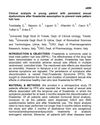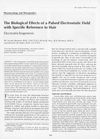June 2020 in “Journal of Face Aesthetics” PRP mesotherapy can effectively treat male hair loss with minimal side effects.
 November 2019 in “Actas Dermo-Sifiliográficas”
November 2019 in “Actas Dermo-Sifiliográficas” Oral minoxidil helps treat hair loss and has reversible side effects.
June 2019 in “Journal of Drug Delivery and Therapeutics” Finasteride effectively treats hair loss and prostate issues with minimal side effects.
January 2019 in “Journal of Clinical Dermatology” The hair tonic improved hair growth and thickness without severe side effects.
December 2017 in “PubMed” Low-level laser therapy may help treat hair loss with fewer side effects.
 July 2016 in “Reactions Weekly”
July 2016 in “Reactions Weekly” Cyproterone and finasteride reduced hypersexuality but caused serious side effects.
 January 2016 in “Global dermatology”
January 2016 in “Global dermatology” A treatment called Cellcurin, combined with microneedling, significantly increased hair density and diameter in patients with hair loss.
 October 2015 in “Elsevier eBooks”
October 2015 in “Elsevier eBooks” Finasteride helps hair growth and prostate issues but may cause sexual side effects and increase tumor risk.
 February 2012 in “European Urology Supplements”
February 2012 in “European Urology Supplements” Finasteride for hair loss may cause long-lasting sexual side effects in young males.
January 2002 in “Journal of Clinical Dermatology” Finasteride effectively treats hair loss in Chinese men with minimal side effects.
53 citations,
January 1985 in “Acta obstetricia et gynecologica Scandinavica” Low-dose oral contraceptives reduced hair growth and testosterone levels in women with polycystic ovary syndrome.
 41 citations,
June 2010 in “Anais Brasileiros de Dermatologia”
41 citations,
June 2010 in “Anais Brasileiros de Dermatologia” Isotretinoin is safe and effective for acne, with common side effects like dry lips; serious side effects are rare.
 38 citations,
October 1988 in “Clinics in Dermatology”
38 citations,
October 1988 in “Clinics in Dermatology” Minoxidil can help grow hair and make hair follicles bigger, but it can also cause side effects.
 27 citations,
July 1990 in “International Journal of Dermatology”
27 citations,
July 1990 in “International Journal of Dermatology” A pulsed electrical field safely and effectively increased hair growth.
 27 citations,
January 1984 in “Pharmacology & Therapeutics”
27 citations,
January 1984 in “Pharmacology & Therapeutics” Antiandrogens have important biological effects, but more research is needed to understand them fully and compare their effectiveness and side effects to other treatments.
 18 citations,
January 1998 in “Endocrine”
18 citations,
January 1998 in “Endocrine” RU58841, a nonsteroidal anti-androgen, showed potential as a topical treatment for hair loss, increasing hair density, thickness, and length without systemic side effects in Stumptailed Macaques.
17 citations,
January 1984 in “Psychotherapy and psychosomatics” Antiandrogen treatment can reduce sexual enjoyment in women with excess male hormones, especially those in stable relationships.
 15 citations,
January 2018 in “Acta dermato-venereologica”
15 citations,
January 2018 in “Acta dermato-venereologica” Finasteride and dutasteride increase sexual dysfunction risk by 1.57 times in male hair loss treatment.
7 citations,
May 2021 in “Seizure” Some antiseizure medications can cause cosmetic problems like hair loss, excessive hair growth, acne, and gum overgrowth.
 7 citations,
May 2017 in “Research and Practice in Thrombosis and Haemostasis”
7 citations,
May 2017 in “Research and Practice in Thrombosis and Haemostasis” Some blood thinners can cause hair loss, but switching medications can stop it.
 6 citations,
October 2013 in “Expert Review of Dermatology”
6 citations,
October 2013 in “Expert Review of Dermatology” Psychotropic medications can cause skin problems, including serious conditions, and patients should be monitored closely.
 3 citations,
January 2016 in “Biotechnology and Bioprocess Engineering”
3 citations,
January 2016 in “Biotechnology and Bioprocess Engineering” Laminaria japonica extract with IGF-1 improved mouse hair growth and could be a potential alopecia treatment.
 2 citations,
July 1982 in “British Journal of Dermatology”
2 citations,
July 1982 in “British Journal of Dermatology” Retinol acetate can reduce the harmful effects of the drug benoxaprofen on white blood cells.
 October 2024 in “Scientific Reports”
October 2024 in “Scientific Reports” OXTR agonists may promote hair growth and be effective for treating hair loss.
 July 2024 in “International Journal of Molecular Sciences”
July 2024 in “International Journal of Molecular Sciences” Hemp seed biomaterials may reduce hair loss and improve hair growth.
 March 2024 in “BMC women's health”
March 2024 in “BMC women's health” The levonorgestrel implant increases free testosterone and lowers SHBG more than DMPA-IM and the copper IUD.
October 2023 in “Nutrients” Millet and wheat extracts may improve hair health and promote growth.
 August 2023 in “JAAD International”
August 2023 in “JAAD International” Low dose oral minoxidil is generally safe and can improve hair loss in women, with some experiencing side effects and minimal blood pressure changes.
 September 2022 in “Frontiers in Bioengineering and Biotechnology”
September 2022 in “Frontiers in Bioengineering and Biotechnology” Taxifolin from Rhododendron mucronulatum may help prevent hair loss and promote hair growth.
 July 2021 in “Research, Society and Development”
July 2021 in “Research, Society and Development” Minoxidil is effective and safe for hair growth in Androgenetic Alopecia, with manageable side effects.




















